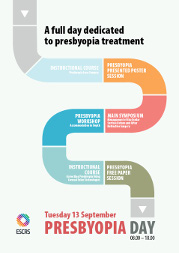Posters
Descemet's stripping automated endothelial keratoplasty (DSAEK) in eyes with previous Ahmed valve implantation
Poster Details
First Author: A. Abreu PORTUGAL
Co Author(s): J. Coelho L. Malheiro M. Meneres L. Oliveira
Abstract Details
Purpose:
Glaucoma drainage devices are being used more frequently in the treatment of glaucoma that does not respond to medications or other glaucoma surgeries. However, the risk of endothelial dysfunction exists and, in patients who develop irreversible endothelial compromise, corneal transplantation is the only option to restore visual acuity. Descemet Stripping Automated Endothelial Keratoplasty (DSAEK), despite technically more difficult, provides remarkably visual recovery and has a good complication profile, becoming the procedure of choice in cases of endothelial failure. The aim of this study is to evaluate the outcomes of DSAEK in eyes with previous Ahmed Valve (AV) implantation.
Setting:
Department of Ophthalmology of a tertiary referral centre in Oporto, Portugal - Centro Hospitalar do Porto.
Methods:
In this non-randomized, retrospective study, we analysed the clinical records of the patients submitted to DSAEK that had previously undergone implantation of an AV, in our department. DSAEKs were performed by a single surgeon. We evaluated the demographic data; preoperative and postoperative endothelial cell counts, best corrected visual acuity (BCVA) and intraocular pressure (IOP); follow-up time; intraoperative and postoperative complications and graft survival.
Results:
Four eyes (4 patients) were included. Mean age was 74.5 years. Two cases had uveitic glaucoma; 1 had primary open-angle glaucoma and 1 had secondary glaucoma in familial amyloid polyneuropathy. Endothelial dysfunction was diagnosed, on average, 23.5 months after AV implantation. No intraoperative complications were reported; 1 patient experienced graft detachment one week after DSAEK with the need of rebubbling. Mean follow-up was 16 months. At the end of follow-up, BCVA improved in 3 patients; IOP increased from 14mmHg to 16.5mmHg; endothelial cell counts decreased, on average, 51%. 1 eye had failed DSAEK graft at 5 months, with the need of penetrating keratoplasty.
Conclusions:
Although technically demanding in eyes with glaucoma drainage devices, DSAEK can be successfully and safely done, presenting itself as an alternative to penetrating keratoplasty. Close monitoring of IOP and endothelial cell density is important in the follow-up. Longer follow-up will be critical to access endothelial cell loss and graft survival in the long term in these special cases.
Financial Disclosure:
NONE





